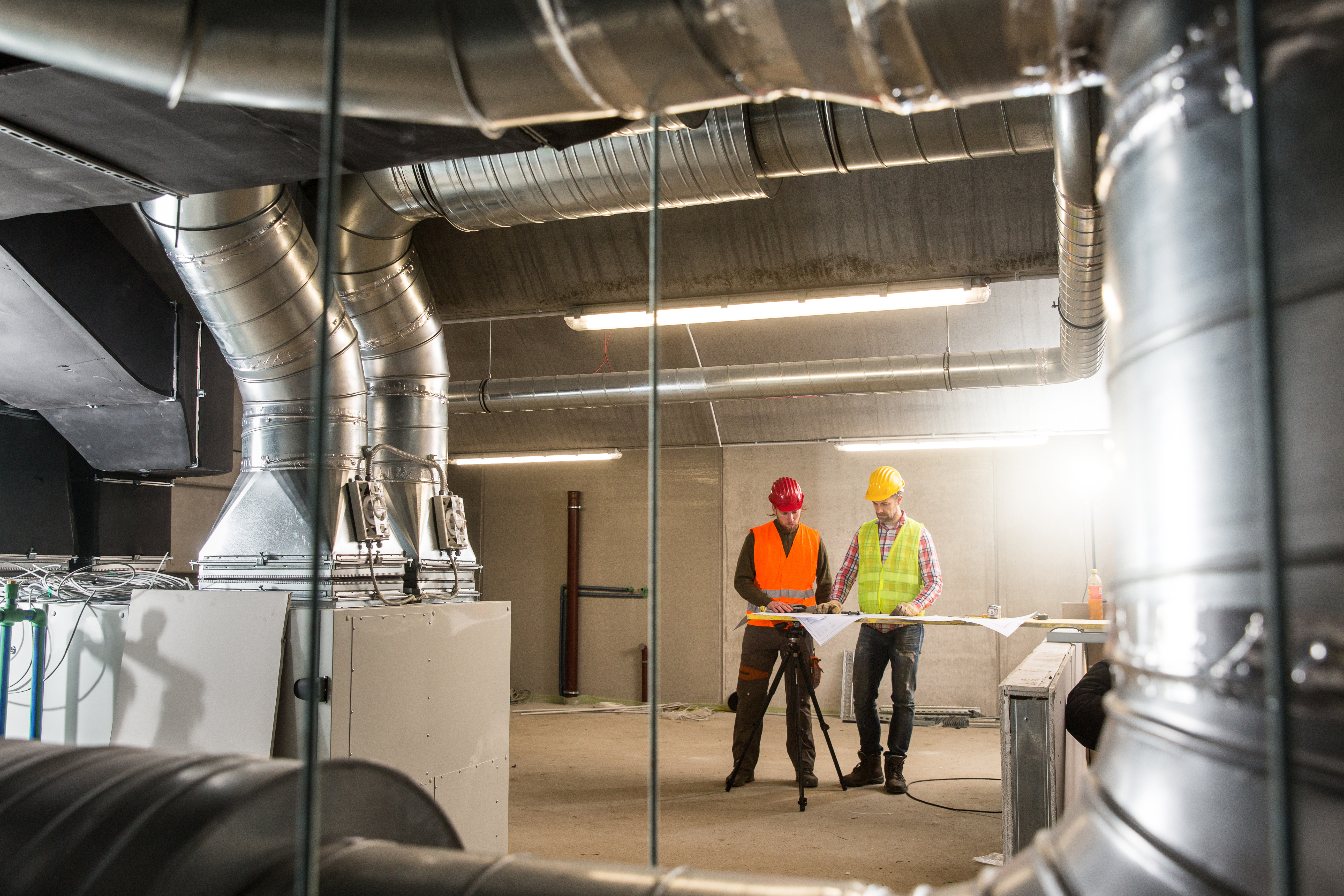Discovering the Important Elements of an Efficient A/c System
An efficient HVAC system is improved a number of vital parts that operate in consistency. Each component, from the thermostat to the ductwork, plays a crucial duty in preserving convenience and power effectiveness. Understanding these aspects is essential for maximizing performance and improving interior air high quality. As one analyzes these components, the detailed partnerships in between them disclose insights into enhancing overall system effectiveness. What certain variables contribute most to this efficiency?
The Function of the Thermostat in A/c Efficiency

Usually forgotten, the thermostat plays a critical function in the performance of Cooling and heating systems. This little gadget functions as the primary nerve center, managing temperature setups and making certain ideal convenience within a room. By properly picking up the ambient temperature, the thermostat communicates with the air flow, air, and heating conditioning units to preserve the desired environment
An effective thermostat reduces energy usage by activating the a/c system only when necessary, therefore preventing too much heating or air conditioning. Modern wise and programmable thermostats improve this efficiency better by permitting customers to establish timetables and remotely change setups, adjusting to daily routines.
In addition, the positioning of the thermostat is necessary; incorrect area can lead to imprecise temperature analyses, resulting in inefficient procedure. Overall, a well-functioning thermostat not only enhances comfort yet likewise adds considerably to power financial savings and the longevity of the a/c system.
Comprehending the Value of Air Filters
Air filters serve an essential function in a/c systems by assuring that the air distributing within a space stays clean and healthy. These filters catch dust, irritants, and various other pollutants, preventing them from being recirculated throughout the atmosphere. By catching these bits, air filters add to boosted interior air quality, which can considerably profit owners' health and wellness, particularly those with allergic reactions or respiratory conditions.
Additionally, preserving tidy air filters boosts the efficiency of a/c systems. Clogged filters can restrict air movement, creating the system to function more challenging to preserve desired temperature levels, bring about raised energy consumption and higher utility costs. Regularly changing or cleaning filters is a crucial maintenance action that can extend the life expectancy of a/c tools. Eventually, recognizing the importance of air filters allows home owners and structure supervisors to take proactive actions to ensure a well-functioning, reliable HVAC system that promotes a comfy and safe indoor atmosphere.

The Functionality of the Heating System and Warmth Pump
Heating systems and heatpump are critical parts of a/c systems, in charge of giving heat during cooler months. Furnaces run by home heating air through burning or electric resistance, after that distributing it throughout the home through air ducts. They usually supply fast home heating and can be fueled by gas, electrical energy, or oil, depending on the system type.
On the other hand, heatpump transfer warmth as opposed to generate it. They draw out warmth from the outside air or ground, even in reduced temperatures, and transfer it inside your home. HVAC experts. This dual capability allows heatpump to also supply cooling in warmer months, making them flexible alternatives for year-round climate control
Both systems require appropriate maintenance to assure effectiveness and longevity. While furnaces master severe cool, heatpump can be helpful in moderate climates. Recognizing their distinct capabilities help house owners in choosing the most appropriate choice for their heating needs.
Exploring the Air Conditioning System
The a/c device is an essential element of HVAC systems, offered in different types to suit different requirements. Comprehending the efficiency ratings of these units is vital for making educated choices regarding energy usage and expense. This section will certainly check out the varied sorts of ac unit and make clear exactly how performance scores influence performance.
Kinds Of Air Conditioners
While numerous factors affect the selection of air conditioning systems, understanding the different types offered is vital for house owners and building managers alike. Central air conditioners are made to cool down whole homes or structures, using a network of air ducts for airflow. Window devices supply a more local service, perfect for tiny spaces or single spaces. Portable ac unit provide flexibility, permitting customers to move the device as needed. Ductless mini-split systems are another alternative, incorporating the performance of central systems with the convenience of zoning, as they call for no ductwork. Ultimately, geothermal systems harness the planet's temperature for energy-efficient air conditioning. Each kind includes distinct benefits, making educated options vital for effective environment control.

Performance Scores Discussed
Comprehending efficiency rankings is important for picking the ideal air conditioning unit, as these metrics supply insight right into the system's performance and power consumption. The most usual rating for ac system is the Seasonal Power Effectiveness Proportion (SEER), which determines the cooling outcome throughout a typical air conditioning period separated by the total electric energy input. A greater SEER indicates far better effectiveness. In addition, the Energy Effectiveness Proportion (EER) is used for measuring efficiency under certain conditions. One more vital metric is the Energy Star accreditation, which indicates that a device fulfills rigorous energy efficiency guidelines. By reviewing these ratings, customers can make enlightened options that not only enhance convenience but additionally reduce power expenses and environmental influence.
The Significance of Ductwork and Airflow
Reliable ductwork design and air flow administration play critical roles in the overall effectiveness and efficiency of heating and cooling systems. Proper ductwork guarantees that conditioned air is distributed uniformly throughout a room, reducing temperature fluctuations and improving comfort. Properly designed air ducts lessen resistance to air flow, lowering the workload on HVAC devices and ultimately reducing power usage.
Air movement administration includes tactically positioning vents and registers to enhance the circulation of air. This prevents common problems such as warm or cool places, which can happen when airflow is blocked or improperly balanced. In addition, the right air duct materials and insulation can better boost effectiveness by reducing heat loss or gain throughout air transportation.
An effective ductwork system not only contributes to energy savings however can also lengthen the life expectancy of a/c equipment by reducing unneeded strain (HVAC experts). Subsequently, recognizing the relevance of ductwork and air movement is essential for accomplishing peak heating and cooling system performance
Regular Maintenance Practices to Enhance Performance
Routine maintenance practices are essential for making sure peak performance of cooling and heating systems. These techniques consist of routine inspections, cleansing, and necessary repair work to maintain the system running efficiently. Frequently changing air filters is crucial, as stopped up filters can obstruct air flow and reduce performance. Additionally, specialists ought to check and tidy evaporator and condenser coils to avoid getting too hot and power waste.
Yearly specialist evaluations are likewise suggested, as qualified technicians can determine prospective issues before they intensify. Lubricating relocating parts lessens damage, adding to a longer life-span for the system. Furthermore, making sure that the thermostat functions correctly aids in keeping optimal temperature control.

Often Asked Concerns
Just how Often Should I Change My Thermostat?
Thermostats must typically be replaced every 5 to ten years, depending upon use and technology advancements. Routine checks are a good idea to ensure peak performance, especially if experiencing irregular temperature level control or enhanced energy costs.
What Dimension Air Filter Is Ideal for My HVAC System?
The finest dimension air filter for a cooling and heating system varies by system style. Usually, it's vital to consult the proprietor's handbook or examine the existing filter measurements to ensure peak performance and air high quality.
Can I Set Up a Heatpump Myself?
Setting up a heatpump independently is possible for proficient people, yet it needs expertise of local codes and electrical systems. Working with a specialist is advised to guarantee appropriate installment and suitable system efficiency.
Just how Do I Know if My Ductwork Is Efficient?
To figure out ductwork performance, one should inspect for leakages, action airflow at vents, examine click here insulation high quality, and evaluate temperature level differences in between supply and return air ducts. Specialist analyses can offer extensive understandings right into general efficiency.
What Are Indicators My A/c Needs Immediate Maintenance?
Indications that an a/c system needs instant upkeep consist of unusual sounds, irregular temperatures, raised energy expenses, undesirable odors, and regular cycling. Addressing these concerns quickly can avoid more damages and guarantee height system efficiency.
Air filters serve a necessary feature in HVAC systems by guaranteeing that the air distributing within a room continues to be healthy and balanced and clean. In addition, maintaining clean air filters improves the effectiveness of A/c systems. Ductless mini-split systems are an additional alternative, combining the performance of main systems with the comfort of zoning, as they call for no ductwork. Comprehending efficiency ratings is essential for picking the right air conditioning unit, as these metrics offer insight into the system's performance and energy intake. The best size air filter for a HVAC system differs by system style.